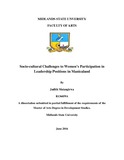Please use this identifier to cite or link to this item:
https://cris.library.msu.ac.zw//handle/11408/2188| Title: | Socio-cultural challenges to women’s participation in leadership positions in Manicaland | Authors: | Mutangirwa, Judith | Keywords: | Socio-cultural beliefs and practices. | Issue Date: | Jun-2016 | Publisher: | Midlands State University | Abstract: | This study is a qualitative study which explored the experiences of female leaders in Manicaland Province in an attempt to establish challenges related their socio-cultural beliefs and practices. Zimbabwe is a patriarchal society that upholds male values, and this is the context female leaders have to operate in and excel. There are cultural and societal expectations that have an impact on female leaders considering that cultural values give them a subordinate position while men are the natural leaders (Hlatywayo & Hlatywayo, 2014). The study purposively sampled thirteen women that occupied provincial level positions in Manicaland for in-depth interviews. Information from in-depth interviews was complemented with data generated from three FGDs with a group of women in college as well as ordinary women. The study found that while there are supportive international conventions and national protocols guiding gender issues, women in Zimbabwe are marginalized by in key decision making positions through practice, attitudes and gender stereotypes that are deeply entrenched in the country’s traditional culture. Despite the efforts of government and civil society in mobilizing and conscientising women and men on gender issues, the findings of this research suggest that patriarchy is still deeply entrenched in the socialization process. The research shows that the early socialization process that only prepared girls for marriage and motherhood has had such a huge impact in women’s adult life, where they think twice before they venture into leadership because of low self-esteem and fear of judgmental attitudes from their communities. Or if they find themselves in leadership, they come back home to a paranoid husband with a wounded ego who feels threatened by the success of his wife. This study argues that unless these patriarchal systems are dismantled, achieving gender equality in key decision making will be a long and winding process. | URI: | http://hdl.handle.net/11408/2188 |
| Appears in Collections: | Master Of Arts In Development Studies |
Files in This Item:
| File | Description | Size | Format | |
|---|---|---|---|---|
| mutangirwaJudith-post vivas final 18 july.pdf | Full Text | 4.72 MB | Adobe PDF |  View/Open |
Page view(s)
82
checked on Apr 18, 2025
Download(s)
68
checked on Apr 18, 2025
Google ScholarTM
Check
Items in MSUIR are protected by copyright, with all rights reserved, unless otherwise indicated.



